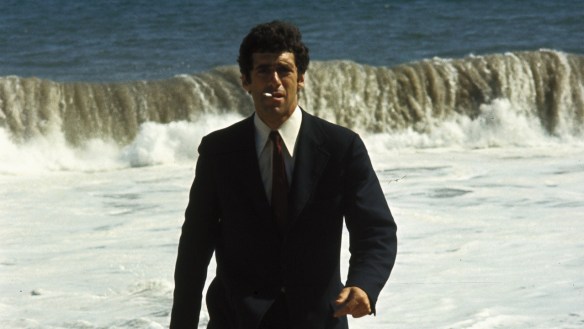Hello folks, and welcome back to Wrong Every Time. This week my house finished off our rewatch of Slayers’ original three seasons, which we then followed up with the first Slayers film. This unfortunately proved a total disappointment; the film basically butchers Lina’s character, the tone shifts from fantasy adventure to outright farce, and Lina’s reliable adventuring party has been replaced by one obnoxious co-lead. Considering the other films all apparently follow this same formula, I’m now debating whether we should jump to the more recent Revolution seasons or just consider the franchise finished. I know those are generally less highly regarded than the original series, but it’s frankly hard to say goodbye to Lina and the gang – particularly knowing that with this, we’ve basically burned through anime’s apparent catalog of tabletop-reminiscent fantasy adventures. Anyway, our Slayers travels were accompanied by plenty of the usual film screenings, so let’s break down some movies in the Week in Review!
Our first viewing this week was The Long Goodbye, a Robert Altman neo-noir feature adapted from a Raymond Chandler novel, and starring Elliott Gould in a truly distinctive take on famed detective Philip Marlowe. Interrupted on a late-night cat food expedition by his friend Terry Lennox, he agrees to drive his panicking buddy to Tijuana. Marlowe is swiftly arrested upon returning home on suspicion of helping Lennox kill his wife Sylvia, but is released when Lennox turns up dead of apparent suicide. Sensing serious funny business and determined to clear his friend’s name, Marlowe embarks on a wandering investigation that turns up more dirty laundry than he could have imagined.
I haven’t particularly enjoyed Altman’s massive ensemble features, but goddamn can the man break a genre over his knee. His McCabe and Mrs. Miller is likely my favorite revisionist western, and The Long Goodbye stands as an impeccable revisionist noir, challenging both the authority of the allegedly incorruptible private eye and the coherency of the world he is setting to order. Gould’s Marlowe sashays and charms, but his elaborate dance towards the truth never brings catharsis – only terrible revelation, as he learns no moral or emotional pillar is so sturdy as to bear his weight upon it.
The distinctive pleasure of Altman and Gould’s take on Marlowe is clear right from the film’s opening minutes, as the camera sleepily follows Gould from his apartment down to the local twenty-four hour mart, Gould muttering all the while about cat food, yoga, or whatever else crosses his mind. Gould’s lackadaisical swagger is basically a perfect model for Spike Spiegel, and his investigations are conducted with similar indifference, as he naturally embodies that Columbo-style trick of acting so muddled and unassuming that secrets just spill out in front of him.
Altman’s apparent contempt for gumshoe glamor becomes a form of glamor all its own; in refusing to act like a self-consciously cool investigator, Gould casually constructs one of the coolest characters in film history. And this revisionist tone actually suits the film’s central mystery perfectly; Gould asks nothing of the world and is still disappointed, his preemptive moral concession to an array of philosophically-minded crooks insufficient to avoid being genuinely hurt by the callousness of human nature. I wouldn’t recommend this as someone’s first noir feature, but it serves as both essential commentary on the genre and one of its greatest triumphs.
Next up was Don’t Mess With Grandma, a recent Michael Jai White feature that sees him attempting his own Kindergarten Cop-style turn into action-comedy. He stars as a former army ranger with a bum leg and a chip on his shoulder, who spends much of his time trying to maintain his grandmother’s family home. When a group of presumed thieves attempt to break into grandma’s house, White finds himself back in the field of combat, fending off a series of ill-considered home invasions with whatever tools are at hand.
Don’t Mess With Grandma is fitfully successful as a film; the script is largely shapeless, the narrative has no momentum, and at least half the cast have little reason to be there. That said, it does succeed in its central priority: proving Michael Jai White can actually hold down an action-comedy lead role, and provide enough charisma to keep things watchable. He acts his ass off all throughout this film, demonstrating far greater dramatic range than his usual physicality-oriented roles can offer, and absolutely selling both the buffoonery of his character and the pathos of his relationship with his grandmother. Like Scott Adkins, Michael Jai White has spent a long time churning out unglamorous action features; if this is a turning point in his career, I’m very happy for him.
We then checked out the recent disaster feature Twisters, starring Daisy Edgar-Jones as a former storm chaser who abandoned the field after the death of several close friends. Drawn back to the action by an old compatriot (Anthony Ramos), she swiftly forms a rivalry with a storm-chasing, live-streaming cowboy (Glen Powell), as they collectively clash with a sudden Oklahoma tornado outbreak.
Twisters seems like an odd followup feature for Minari director Lee Isaac Chung, but he proves a perfectly adept hand, demonstrating both a talent for dynamic action sequences and an overflowing love for midwestern culture. You will see an entire rodeo stadium gobbled up by the angry heavens, alongside various other epic contrasts of human ambition and divine obliteration, all while Glen Powell expertly digs himself a character-sabotage hole and then rockets straight back out of it. Having seen the breadth of his talents in Hit Man, it seems almost unfair to assign him a role as straightforward and flattering as “big-hearted tornado wrangler” – he unsurprisingly kills it, with his charisma offering a fine counterpoint to Twisters’ awe-inspiring Spielbergian setpieces. A simply excellent slice of genre goodness.
We then continued our long slog through the slasher canon with Friday the 13th Part VIII: Jason Takes Manhattan. Technically, Jason only spends the last twenty-five or so minutes of this film actively taking Manhattan; it would more accurately be titled Jason Rides A Boat To Manhattan, but I suppose at that point you lose the “Debbie Does Dallas” punchiness of the title.
Anyway, Jason’s on a boat this time, and boy is he mad! A decade-plus into this inherently compromised franchise, the producers are basically throwing whatever they can at the wall, combining remnants of the last entry’s “what if the final girl had a psychic link with Jason” gimmick with a slew of largely-implied acts of murderous mayhem.
Coming at the end of the crime-anxious ‘80s, it’s at least interesting to see how Jason’s reputation has shifted relative to the concerns of the era. As the franchise’s only persistent character, he’s essentially become an old friend at this point, while the city of New York is presented as a gurgling hellhole. So I guess Jason Takes Manhattan illustrates a moment in time when people were more afraid of being mugged on the street than being macheted to pieces by a guy in a hockey mask, making it an interesting historical curio, if not a particularly compelling film. And if you want a good take on shifting cultural horrors, I am always eager to recommend Targets.




